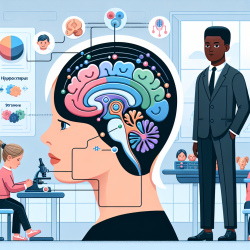Introduction
Understanding auditory perception is crucial in speech-language pathology, especially when working with children. The research article "Differences in Auditory Perception Between Young and Older Adults When Controlling for Differences in Hearing Loss and Cognition" provides valuable insights into how auditory perception is influenced by age-related factors. Although the study focuses on adults, its findings can help practitioners enhance their skills and improve outcomes for children.
Key Findings from the Research
The study conducted by Lentz, Humes, and Kidd (2022) examined the auditory perceptual skills of young and older adults, controlling for hearing loss and cognitive declines. The research highlighted the following key points:
- Older adults showed lower thresholds in tasks involving temporal processing, suggesting age-related declines in these areas.
- Hearing loss significantly impacted performance on several psychoacoustic tasks, affecting the ability to process auditory information.
- Cognitive declines, particularly in working memory, were linked to poorer performance in auditory perception tasks.
Implications for Practitioners Working with Children
While the study focused on adults, the findings can inform practices in pediatric speech-language pathology:
- Early Assessment: Conduct thorough auditory assessments for children, considering potential hearing loss and cognitive factors that may affect auditory perception.
- Targeted Interventions: Develop interventions that address specific auditory processing challenges, such as temporal processing and working memory, to improve speech perception and communication skills.
- Holistic Approach: Consider the interplay between auditory perception, cognition, and hearing health when designing therapy plans for children.
Encouraging Further Research
The study underscores the importance of continued research into the factors affecting auditory perception. Practitioners are encouraged to explore the following areas:
- Investigate the impact of cognitive training on auditory perception in children with hearing loss.
- Examine the role of early intervention in mitigating age-related declines in auditory processing.
- Explore the relationship between auditory perception and language development in children.
Conclusion
By understanding the factors that influence auditory perception, practitioners can enhance their skills and improve outcomes for children. The research by Lentz et al. (2022) provides a foundation for developing data-driven interventions that address the unique needs of young clients. To read the original research paper, please follow this link: Differences in Auditory Perception Between Young and Older Adults When Controlling for Differences in Hearing Loss and Cognition.










